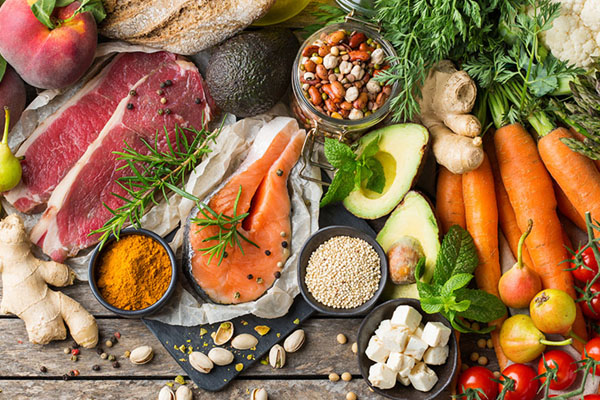7 Nutrients You’re Probably Not Eating Enough Of
Posted by: Regenerate Medical Concierge in Learn

If you eat healthy foods and have a varied diet, you might think that you get the most important nutrients you need.
But actually, many Americans lack enough important nutrients like vitamins C, D, and E. Increasing your intake of veggies and fruits might not even make up for the difference either.
While you may not notice some nutrient deficiencies, others can make you experience symptoms like a low energy level, upset stomach, and brittle nails. Prolonged deficiency can lead to serious health problems too.
7 essential nutrients you’re probably not getting enough of.
1. Potassium
To have strong bones and healthy muscles and nerves, you’ll need to have enough potassium.
If you don’t get enough potassium, you can end up feeling weak, have heart and breathing troubles, and feel like your muscles are achy and stiff. You can even experience changes in your mood.
Kidney beans, sweet potatoes, and raw spinach are among some of the best foods for their potassium content. On the other hand, if you drink a lot of alcohol or take certain medications like laxatives and antibiotics, you can also end up with a low potassium level.
2. Calcium
Important for strong bones and a healthy heart and muscles, calcium is another essential nutrient you may lack.
When you’re lacking calcium, your back and legs might ache, and your skin and hair can seem dry. If your levels drop to more severe levels, you can have muscle spasms and even seizures. You’ll also find that your bones become more prone to breaks.
You’ll usually get calcium through certain types of nuts, dairy products like milk and cheese, and dark green veggies. If you have a health condition or diet that causes you to limit dairy products, you run a higher risk of deficiency.
3. Magnesium
With deficiency often impacting women, the elderly, and African Americans, magnesium is another key nutrient for your bones, nerves, and muscles.
Women who don’t get enough magnesium can experience problems with their periods. Anybody deficient may get aches and pains, have mood and sleep issues, and have heart trouble.
Whole grains, leafy veggies, beans, and nuts all serve as good sources of this nutrient. Some dairy products also contain magnesium.
4. Fiber
Essential for digestion and control of your blood sugar and cholesterol, many men and women don’t get the recommended grams per day of fiber.
Lacking fiber can make you feel hungry more often and gain weight. You can also become constipated and feel bloated often. High blood sugar and cholesterol levels can also happen.
Whole grains, veggies, and fruits can give you the fiber you need. You can also find fiber supplements in the form of a powder that you add to your food.
5. Vitamin A
Crucial to keep your eyes healthy, vitamin A also plays a role in your reproductive health, immune system, and skin. It actually exists in two forms: preformed vitamin A and provitamin A.
Having a vitamin A deficiency can lead to blindness and can cause you to die from infections in severe cases. Less severe effects can include dry skin, trouble seeing at night, and frequent illness.
Colorful fruits and veggies serve as the best sources of provitamin A. Consider such foods as tomatoes, carrots, spinach, and sweet potatoes.
Sources of preformed vitamin A include eggs, fish oils, and dairy products fortified with the nutrient. You can also find this form in certain types of cereals that add it in.
6. Vitamin C
Often associated with the health of the immune system, vitamin C has other roles in heart, skin, and eye health. It’s also important for a mother to consume when pregnant so that the baby’s healthy.
If you notice issues like bleeding gums, skin rashes, frequent bruising, or muscle problems, you may have a vitamin C deficiency. You might also experience tiredness, a lack of appetite, and weight loss.
When vitamin C deficiency reaches a severe level, you can develop a condition called scurvy. At first, you might have some general symptoms like diarrhea, fever, and feeling unwell. When scurvy progresses, you might notice slow healing of cuts, have bulging eyes, and even lose your teeth.
Citrus drinks and foods can provide a lot of the vitamin C you need each day. Examples include oranges and orange juice, grapefruit, and lemons. You can get the nutrient through other foods like Brussels sprouts, strawberries, and papayas too.
7. Vitamin E
While known for helping you have healthy hair and skin, vitamin E does much more to ensure your body’s health. It can help slow down cell damage, boost the immune system, and assist with blood clotting and red blood cell production. Surprisingly, there are eight forms of this nutrient.
Like with vitamin A, you can face some trouble with your vision if you don’t get enough vitamin E in your diet. You might also have tingling nerves, trouble walking and maintaining balance, and weak muscles. A weak immune system can lead to more infections and longer recovery times, especially if you’re elderly.
Nuts and vegetable oils are some good vitamin E sources. This includes peanuts, sunflower seeds, almonds, corn oil, and hazelnuts. Broccoli, spinach, and other green veggies that have leaves can provide this nutrient as well.
Consider Supplementing These Most Important Nutrients
While you’re probably lacking the most important nutrients discussed, there’s some good news. You can fix the issue with the help of daily vitamins or regular IV vitamin infusions.
If you take a daily multivitamin, you can slowly build up the vitamins you need and see some improvements in symptoms. Your doctor might also test you for vitamin deficiencies and recommend a specific supplement.
But if you want the fastest results, IV vitamin infusions are the way to go since you get the vitamins in your bloodstream directly.
Are you interested? Contact us today to learn more about IV vitamin infusions.
